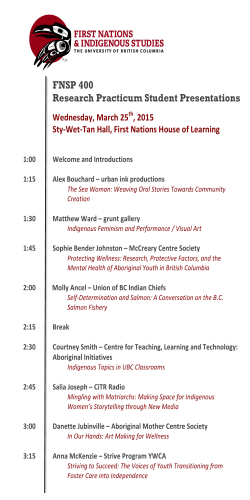
Read More - Geography, Department of
An Anishinabe scholar from Pic River First Nation (Northern Ontario), Dr. Richmond is an Associate Professor in the Department of Geography at Western University, where she also holds cross appointments in both the First Nation Studies Program, and the Department of Family Medicine. Her innovative research program is substantially supported by Tri-Council funding, and is framed by an applied community-based research (CBR) approach that integrates methods and theory from the fields of Health Geography, Indigenous Studies, and Indigenous Health Sciences. The overarching objective of Dr Richmond’s research programme is to understand how the determinants of Indigenous people’s health are shaped by processes of both environmental dispossession and repossession. She is a passionate scholar who has worked tirelessly to create space for Indigenous communities in academic research through her efforts to publish with her community partners, and set an example to her graduate trainees about the importance of doing applied research that not only makes academic contributions but also empowers local communities to be true partners in research. As an Indigenous scholar, Dr. Richmond sees great personal value in doing research that will contribute to the improved health and well-being of the Aboriginal population. At the core of Dr. Richmond’s teaching philosophy, is a strong and persistent belief that educators can and must engage in sharing knowledge, skills and ideas with communities external to academia. She believes that increased public access to the vast array of intellectual, material and social resources (that she argues are too often take for granted in the university) can have long and lasting impacts for Canada as a whole. For this reason, she views her role as a teacher – particularly one concerned with advocating Indigenous health issues – should not be limited to the class room, but rather, must extend well into the Indigenous communities, organizations and policy circles she works with. She recognizes that her role as teacher has multiple dimensions, few of which take place in the classroom as we know it. Professor Richmond views knowledge translation as the most critical and practically applied way of increasing capacity in the communities she works with, specifically through the training and mentoring of graduate and summer students.
© Copyright 2026











